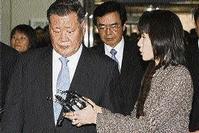
Hyundai Motor's chairman, Chung Mong-koo, leaves as he is asked questions by reporters, after his trial at the Seoul Central District Court, in Seoul, South Korea, Monday, where he was sentenced to three years in jail, sweeping aside widely held expectations of a suspended sentence. - Reuters
SEOUL, South Korea (Reuters):
The head of Hyundai Motor was sentenced to three years in jail for embezzling funds from the world's number six automaker, dealing another blow to a company battling a rising won and restive labour unions.
The surprise ruling, which sent shares in the country's top car-maker down more than 3.0 per cent on Monday, rekindled worries over a management vacuum at the auto giant.
Chung Mong-koo, 68, who was arrested last April on allegations that Hyundai and its affiliates set up slush funds to pay for political favours, will appeal the sentence, officials at Hyundai Motor said.
"This could have a big impact on Hyundai Motor," said Kim Hyun-tae, fund manager at Landmark Investment Management.
Economic impact
"The impact on the Korean economy could be huge."
Combined exports by Hyundai and its affiliate, Kia Motors Corp, account for nearly 7.0 per cent of South Korea's total exports, according to company data.
Chung, wearing a dark grey suit, appeared shaken after the verdict. He quickly left the courtroom, which was filled to capacity with Hyundai group employees, including Chung's son, Kia Motors president, Chung Eui-sun.
The court decided not to revoke Chung's bail terms immediately, citing the need to protect the national economy and to give him time to prepare his appeal.
Hyundai shares were down 1.58 per cent at 68,700 won by 0237 GMT after dropping as much as 3.15 per cent following the sentencing, compared with a 0.23 per cent gain in the broader market
"The court decided a strict execution of law is necessary to eradicate illegal and anti-market practices in the past and help South Korea build a more advanced economy," said Kim Dong-oh, the presiding judge at Seoul Central District Court.
Prosecutors last month demanded a six-year jail term for Chung, the son of Hyundai founder, Chung Ju-yung, whose post-World War II auto-repair shop burgeoned into a sprawling conglomerate.
Auto analysts had expected the court to hand down a suspended jail term to leave Chung at the helm of Hyundai, given the group's importance to the South Korean economy.
In 2004, the Seoul high court suspended a three-year jail term for fraud handed to Chey Tae-won, chief executive of SK Corp., South Korea's top oil refiner, so he could carry on running the company.
SPOTLIGHT ON CHAEBOL
Chung is the eldest surviving son of the late Chung Ju-yung, who founded the Hyundai Group in 1947 and Hyundai Motor in 1967. He took control of Hyundai Motor in 1999 from his uncle, Chung Se-yung, who is credited with Hyundai's rapid growth and was nicknamed 'Pony Chung' after its first model.
Chung's trial covered charges including breach of trust and embezzling company funds, and incurring losses at group companies by forcing them to support weaker affiliates.
The chairman admitted last year to having a role in setting up slush funds through affiliates of Hyundai, although he denied knowledge of details on the funds.
Chung, heavily involved in most decisions at the group, was released on US$1 million bail in June after spending two months in jail.
The case has put the spotlight on management shortcomings at South Korea's powerful 'chaebol'. These family run conglomerates helped rebuild the economy after the 1950-53 Korean War, but were partly blamed for the financial crisis of the late 1990s.
Despite reforms brought in after the 1997-98 Asian financial crisis, some conglomerates are still run like family businesses, shifting money among group companies and using complex share ownership networks to control their business.

